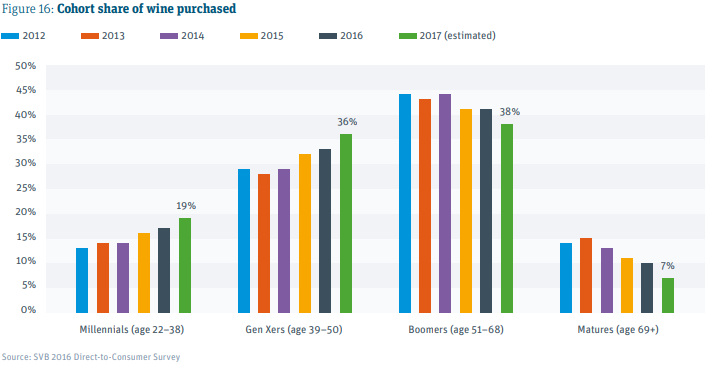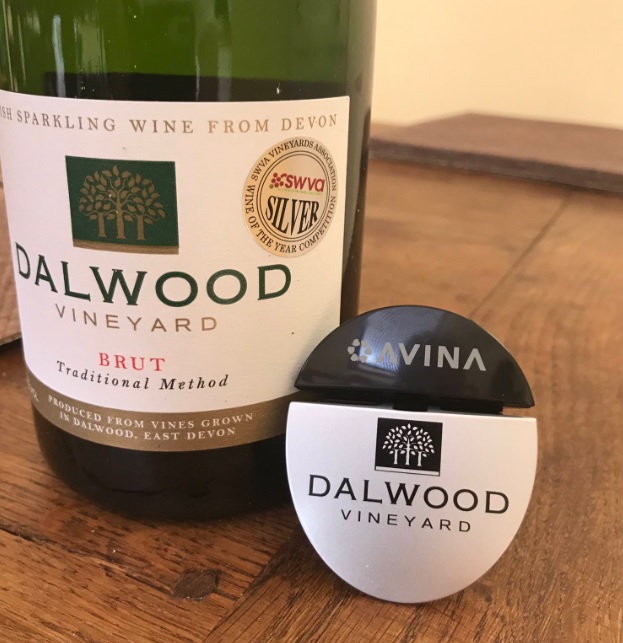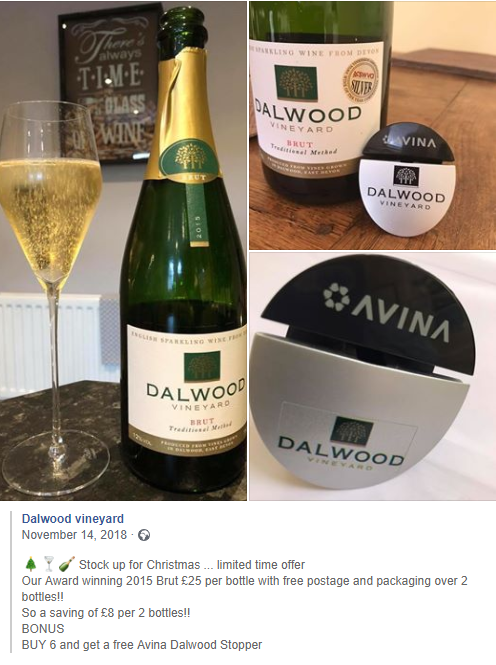Author Archives: Hans Dekker
Author Archives: Hans Dekker
“In order to survive, wineries and similar businesses need to explore strategies that will allow them to raise the average direct-to-consumer order value.”
We have seen regular increases in volume and price for 20 years now in the wine business, according to the SiliconValleyBank 2018 SVB Wine Report. However, sustaining routine increases may be difficult for wineries given the low-growth, low-inflation environment. Price increases will be hard to pass through, says SVB.
Not only that, there is also evidence of changes in consumer preferences. Premium wine is a luxury product and despite a measured growth of 2 percent in the American market, this sector is on an incredible trend down from the 15 percent growth reported in years before.
Among the reasons for this stagnating growth are more well known ones such as consumers transitioning to online and retailers failing to keep up in their digital experience. However, what one of the lesser known reasons is that the US consumer, whether young or old, is focused on experience and value.
Particularly mono-brand retailers are struggling, and no longer can the on-site experience be the defining characteristic for the luxury buyer. This in fact is a warning for wineries that depend on the tasting room as their only path to direct sales or are failing to deliver a versatile offer to their customers.

According to the same report selling wine directly to the consumer has been a survival requirement for some wineries. Despite the alarming state some business owners in the winery industry are in, the industry in general has been cautious with their evolution to more modern direct-to-consumer strategies.
One strategy that would tick all the boxes for wineries is adding more products to their catalog. In 2017 SVB reported Tasting-room revenue is up despite declining visitor numbers, but what is driving that higher revenue is improved average purchases. Wineries are simply selling more per transaction and this seems to be their best bet going forward.
A next step in this approach would be adding branded, tailor made products such as wine accessories. This tactic comes with many more benefits which including a more professional presentation of the wineries brand at events and tastings which could not only lead to better positioning in the DTC market, but in the business market as well.
Charles Krug, the oldest winery in Napa Valley, USA, describes his experience with branded wine accessories by Avina as “working with Avina was a pleasure, and I’ll be happy to show our corkscrews to the staff” and has positive expectations when it comes to direct to consumer sales and brand recognition.
This falls perfectly in to the trend in consumer behavior which is more focused on providing the market with an experience, rather than just trying to sell to them. Building a brand that people will recognize and rave about has not only become important, but essential to the survival of businesses going forward.
With that in mind having a catalog of branded products not only means being able to increase revenue, but will also have a positive impact on building a sustainable brand that does not rely solely on one unpredictable stream of income.
Some wineries and similar businesses have started experimenting with handing out branded products for promotional purposes or bundling them at cost price with other products. This is a great and innovative way of getting a brand into people’s homes, while making your investment back in the process.
One entrepreneur using this exact tactic is Mike Husky of Dalwood Vineyards. In the case study done on his success, which you can find linked below, we dive deeper in to his approach. Bundling products has not only netted him more revenue, it has also caused the Dalwood brand to grow more rapidly while making it’s initial investment back in the process.
READ THE FULL DALWOOD WINERY CASE STUDY HERE
A more risk-free approach for wineries that are looking to test the waters but that are still looking to enhance their customers digital experience and increase their customers average order value would be to set up an affiliate program.
Such a program would mean a minimal investment up front without the winery ever having to touch the physical product but selling it through their own website.
Seeing how the supplier of the product would take care of all the picking and packing, including shipping the product, for many business owners and publishers in the wine sector this could be a welcome opportunity to build out their business without the usual headache involved.
Interested in knowing what works best for your situation? See how we can help or get in touch!
With the ever ongoing transition in consumer buying behavior from offline channels to online ones many retailers find themselves struggling to keep up. Several reports have shown that businesses who fail to offer their customers a valuable online experience are falling behind. In the winery business, where many are relying on providing an exceptional face-to-face experience in tasting rooms, transitioning to online has proven to be too challenging for most.
“A brand is a company’s most important asset. A company can’t “own” it’s facts. If the company’s facts (speed, price, quality) are superior to the competition, any good competitor will duplicate them or improve on them.”
Just as in any business environment those who fail to adapt are usually the ones left behind and the wine business is no exception to this. While the average number of DTC transactions is in steady decline, the more established wineries are able to raise their average order value due to their strong brand image.
In the 2018 SVB Wine Report research shows consumers are placing more value in the experience and connection with a brand rather than just comparing features such as price. However, when comparing offline and online presentation, only a small percentage of entrepreneurs in the wine industry have implemented a consistent image to consumers over multiple touch points in order to build brand recognition.
One more variable to consider for business owners is the changing landscape of the consumers they are targeting. Now representing 19 percent of the current fine wine consumption the millennials are a presence whose impact has falsely been overestimated by the wine industry. This goes to show the fine wine industry has up until now failed to activate the new generation of consumers.
As the millennial generation is approaching their prime spending era, marketing efforts should be aimed at the preferences that are unique to this new segment of consumers entering the wine market.

Factors that play a key role in this are, amongst others, the wineries online presence as well as the environmental policies of the winery. A study carried out by Sonoma State University students amongst millennials clearly showed that website quality was a significant predictor of increased trust in the winery and perceptions of the quality of the wine.
In a different study carried out by the same researchers data suggested: “consumer perceptions about product quality, consumer trust, consumer perceptions about pricing, and positive expectations for the consequences of the wineries actions undertaking the pro-environmental policies, all have strong, positive relationships with the wineries brand equity.”
Most notable point in this is how a positive feeling towards a wine brand directly impacts perceptions of product quality. This goes to show that in order to influence DTC buying behavior winemakers are best off diverting at least part of their focus to building strong, lasting relationships with their consumers.
While not all wine makers seem to be ready to make a strong impact on their brand equity in 2019 there are some positive outliers to be found. One of those examples is the oldest winery in Napa Valley, Charles Krug, who is staying young in the branding department. In our recent case study done on the brand building efforts by the iconic winemaker we went deeper into what tactics work best for the Krug family.
You can download the full case study right here
Granite Creek Vineyard
One more winemaker that is leveraging the power of brand building and storytelling is the Granite Creek Vineyard. They are ticking many of the boxes when it comes to valuable qualities to have in 2019 and are putting them to good use.
Their brand is centered around the organic nature of their wines, something that will prove to be increasingly important going forward. However, there are many more lessons that can be learned from the Northern Arizona based winemaker that can be applied by wineries that aren’t deploying organic growing operations.
Granite Creek has established a community of wine lovers around their brand by creating their very own wine club (called the ‘Case Club’), hosting tastings, live music shows, and other events. The Case Club builds a connection to the brand, so it is a smart way to improve average customer value and build an audience of fans that can be promoted to over the long term, so it’s also an investment in a profitable future.
Combine this with special Valentines events and it is no surprise the Granite Creek fanbase has grown well into the thousands.

Dalwood Vineyard
Another winery that has been innovative with its branding efforts is Dalwood Vineyard. This UK based, award winning wine maker has found a creative way to both increase the average order value and permanently find its way into people’s homes.
In a time of transition to more digital channels, word of mouth is still the strongest form of marketing available and Dalwood know how important the personal touch is in building brand reputation.
You can read the full case study right here

Focus on the audience – key thing to keep in mind when investing in the story and presence of any brand is the audience you are looking to reach. While it might be tempting to build the brand entirely as you had envisioned it, you run the risk of ending up with a brand that is tailored to just your own preferences. While this could certainly make sense from a hobby perspective, it does not from a business one.
Invest in your online channels – It is now more important than ever to focus on your online channels. A strong website will directly impact the perception prospective customers have about the quality of your products and combined with a well equipped web shop this will be a safe bet for winemakers in 2019.
Provide great customer service – it is important to keep in mind that customers are expecting more from their experience with your brand which means investing in your offline touchpoints as well. Being omnipresent will keep you top of mind with your audience and will help establish your wine making business as a brand to be trusted.
In the end you don’t have to be world famous to be successful, just famous enough with the right group of people. To sum up:
Did you and your friends ever come up with this crazy idea after a couple of drinks? Well, you’re not alone. Fact is however (and this might surprise you): most of these ideas never get carried out. But that’s probably for the best though, isn’t it?
Did you and your friends ever come up with this crazy idea after a couple of drinks? Well, you’re not alone. Fact is however (and this might surprise you): most of these ideas never get carried out. But that’s probably for the best though, isn’t it?
In some cases, however, these ideas do come to life and in the case of Dalwood Vineyards that can be seen as a happy ending.
Here’s how they describe it:
“Dalwood Vineyard was an idea first discussed twelve or so years ago, but like many good ideas it took a while to happen. Eventually, the subject came up again over a pint or two, and this time a group of six Dalwood villagers decided to make it happen. Backed by knowledge gained from a course on vine growing at Plumpton College and a willingness to learn, we planted the first vines in Dalwood Vineyard in 2009, the first acre devoted to Seyval Blanc.”

Goals
England is gaining a strong international reputation for sparkling wines, regularly seeing off champagnes and other sparklers in competitions. Because of this, Dalwood Vineyards decided to devote their first crop to a sparkling wine.
This turned out to be the right decision, evidence of which is their 2015 Brut being awarded, two of their wines being picked as finest wines at #ukwinehourlive 2018, and being suppliers to top100 hotels in the United Kingdom.
Their success is only being topped by their ambition heading in to the future, as the Dalwood guys are looking to establish themselves as a dominant presence within the British sparkling wine market.
The Situation
Being a smaller wine maker and trying to get your foot in the door with buyers can be a daunting task. Many wineries are struggling because of this as they are failing to rack up the deals necessary to sustain themselves.
Because of their smaller size and brand awareness amongst the right people the quality of their wines sometimes gets overlooked, as buyers play it safe by going with the more established options available. Because of this diverting some resources to investing in the right professional image becomes necessary.
In order to confidently engage in sales meetings and wine-oriented events winery owners and representatives need to be equipped with the right tools to both make a good first impression, as well as a lasting one.
The Solution
By being able to use their own tailor made, branded wine accessories, Dalwood Vineyard representative Mike Husky is now able to present the brand in a new and improved way.
The ability to seal his own bottles with a branded stopper gives him more confidence presenting his brand at events. With the increased ability to present Dalwood in a professional manner Mike feels it will now be easier to be accepted at wine tastings and buyer meetings.

One of the company’s finest accomplishment for 2018 was being picked to supply the Giner Peanut, a highly decorated British hotel which is featured on several “best of” lists put together by the publishers such as The Times and The Guardian.
Additional Benefits
Their direct to consumer efforts also saw an improvement in 2018. Wine stoppers and sparkling wine stoppers make for a great incentive for customers to trade up – to increase the value of their order. With this exact tactic Dalwood Vineyards were able to improve their revenue in 2018.
By offering a free branded stopper if customers bought a full case of their decorated 2015 Brut, they did not only see an immediate result from their branding efforts, but they also were able to get their brand and logo into the hands and houses of many wine lovers around the country.
This way Dalwood also provides their most loyal members with more opportunities to refer new members. With this they have now added an ongoing customer acquisition strategy with zero effort going forward.
Keeping in mind that the 2018 Silicon Valley Bank Wine Report showed that businesses that are able to raise the average order value per customer are the ones that can increase sales and brand equity, being able to incentivize clients to make a bigger purchase by adding a branded gift is a great way to capture multiple birds with one stone.

Dalwood Vineyards are now able to leave a lasting impression in the hands of their most loyal clients, their average order value has gone up, and they are investing in long-term relationships with their customers without any effort.
Proof of this are their raving customer reviews they recently received:
“Amazing wine! I am always proud to buy from Devon and this wine is no exception. What made it so much more special was the excellent service I received from David in regard to ordering and shipping. Managing to time delivery for when he was in the area (Cambridge!) was good luck, but in general, it was just another example of a fantastic Devon company.”
“Lovely vineyard, lovely people, lovely wines!!!! Can’t recommend highly enough”
It is important to keep in mind that besides serving some of the finest sparkling wine in the United Kingdom, the sparkling personalities of the Dalwood Vineyards guys do help too when it comes to customer satisfaction.
But the importance of investing in the right quality of service shouldn’t be news to any winery owner.
Results
After working with Avina, business owner Mike has been able to improve the brand equity of his winery, as well as directly impact the finances of his business.
What’s next?
What’s next for the Dalwood guys? The are very much looking forward to what 2019 has to offer for them and are feeling confident they will be able to secure many more interesting deals. They also plan on presenting themselves at several wine related events across the country.
Their Avina sparkling wine stoppers will be playing a starring role then too.
For info please contact: info@avinawinetools.com